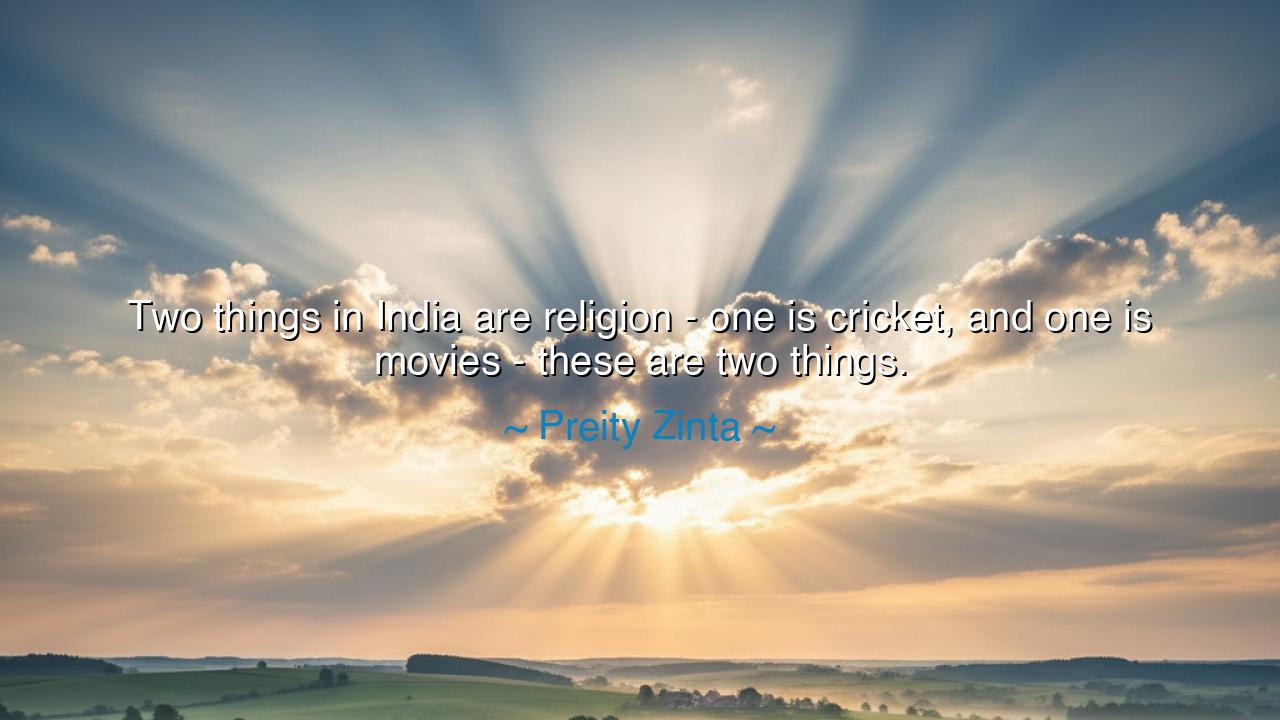
Two things in India are religion - one is cricket, and one is
Two things in India are religion - one is cricket, and one is movies - these are two things.






"Two things in India are religion - one is cricket, and one is movies - these are two things." – Preity Zinta.
In this evocative statement, Preity Zinta captures the essence of Indian culture, where two seemingly different passions, cricket and movies, take on a sacred significance that transcends mere entertainment. They are not just hobbies or pastimes but are woven deeply into the very fabric of Indian identity. Just as religion shapes values, culture, and daily life, so too do cricket and movies play a pivotal role in the emotional and social life of the people. To speak of them in the same breath as religion is to acknowledge their profound influence, not just as forms of entertainment but as powerful forces that shape how people connect with one another, how they express their dreams, and how they navigate life’s struggles.
The ancients were no strangers to the ways in which certain practices or pursuits became deeply intertwined with a society’s identity. In ancient Greece, the Olympic Games were not just sporting events; they were religious festivals, dedicated to Zeus, where victory was seen as a divine blessing and an expression of moral virtue. The connection between sports and spirituality was so intertwined that to win was considered not just a personal triumph, but a tribute to the gods. Similarly, in India, cricket holds a place of such importance that it transcends the boundaries of mere competition. It is akin to a sacred ritual, with fans worshiping their heroes, following every match with devotion and passion that rivals any religious observance.
In the same way, Indian cinema, particularly Bollywood, has become a form of modern-day mythology. The stories told on screen often reflect the hopes, dreams, and struggles of the common people. Heroes in Bollywood films are not just actors; they are seen as gods or goddesses, embodying the virtues of bravery, justice, and love. The songs, the dances, and the dramatic plots speak to the deepest longings of the human heart, making movies a form of spiritual expression for millions. Just as ancient epics like the Mahabharata and the Ramayana were more than stories—they were moral guides and spiritual lessons—so too does modern Bollywood serve as a reflection of the values and aspirations of Indian society.
The connection between religion and cricket or movies in India can be seen in the frenzied devotion with which fans approach these activities. The Indian Premier League (IPL), for example, is not just a cricket tournament but a cultural event that draws the attention of millions, creating a sense of community and shared experience that is almost religious in its intensity. Cricket players become icons, with followers viewing their every move with the same reverence as a worshiper might look up to a spiritual leader. Similarly, the actors in Bollywood, through their roles, often serve as moral exemplars or cultural symbols, guiding how people view themselves and their society. Their films provide not only entertainment, but also the values and lessons that many hold dear.
Consider the example of Sachin Tendulkar, the legendary cricketer often referred to as the "God of Cricket" in India. Tendulkar’s devotion to his craft, his humility, and his unparalleled skill elevated him to a level that went far beyond the boundaries of sport. His career was followed with such intensity and love that it became a religious experience for millions. Each century he scored, each match he played, was celebrated as a divine moment, a symbol of hope, dedication, and national pride. In the eyes of his fans, Tendulkar wasn’t just a cricketer; he was a spiritual guide leading them through the trials and tribulations of life, giving them moments of joy and inspiration.
Similarly, Bollywood films have shaped generations of Indians, imparting lessons about duty, love, justice, and honor. Films like Lagaan, Sholay, and Dilwale Dulhania Le Jayenge have become more than just movies—they are modern mythologies that reflect the cultural soul of India. They are viewed not just for their entertainment value, but for the deep emotional and spiritual truths they offer. The characters in these films are not just people on screen; they represent virtues and dreams that resonate with millions. Actors, in this sense, are revered figures who carry these ideals forward, embodying what it means to be a hero or a leader in the eyes of society.
The lesson here is clear: life is not just about the daily grind or the pursuit of individual success. It is about how we come together as a community, how we find meaning in the collective experiences that bind us. Cricket and movies in India, like religion, are not simply forms of entertainment; they are avenues through which people find connection, inspiration, and shared purpose. These activities teach us that our sense of identity and community is shaped by what we love, what we celebrate, and how we engage with the world around us. Religion and cultural practices, whether in the form of spiritual devotion or national passion, are vital threads in the fabric of life, weaving us together in a shared journey.
In our own lives, we must recognize that what we hold sacred and passionate about shapes the very essence of our existence. Whether it’s through sports, arts, or faith, these are the forces that connect us and help us grow. Let us embrace what binds us together, finding deeper meaning and joy in our shared experiences. Life is not simply about individual success; it is about the collective journey and the connection we find in those who walk with us, whether they are in the same foxhole, stadium, or movie theater.






AAdministratorAdministrator
Welcome, honored guests. Please leave a comment, we will respond soon